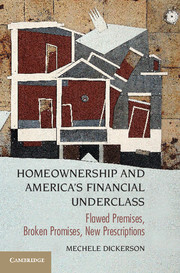 Homeownership and America's Financial Underclass
Homeownership and America's Financial Underclass Book contents
- Frontmatter
- Dedication
- Contents
- Acknowledgments
- 1 Chasing the American Dream
- 2 The Happy Homeownership Narrative
- 3 U.S. Support for Homeowners
- 4 The Homeownership Crisis
- 5 Homeowner Harm and the Blame Game
- 6 Flawed Premises
- 7 The Burden of Home Buying While Black or Latino
- 8 The Benefits of Home Buying While Black or Latino
- 9 Homeownership: Educational Disparities
- 10 Homeownership: Income Disparities
- 11 Outlook and Prescription for the Future
- Index
- References
8 - The Benefits of Home Buying While Black or Latino
Published online by Cambridge University Press: 05 July 2014
- Frontmatter
- Dedication
- Contents
- Acknowledgments
- 1 Chasing the American Dream
- 2 The Happy Homeownership Narrative
- 3 U.S. Support for Homeowners
- 4 The Homeownership Crisis
- 5 Homeowner Harm and the Blame Game
- 6 Flawed Premises
- 7 The Burden of Home Buying While Black or Latino
- 8 The Benefits of Home Buying While Black or Latino
- 9 Homeownership: Educational Disparities
- 10 Homeownership: Income Disparities
- 11 Outlook and Prescription for the Future
- Index
- References
Summary
Blacks and Latinos have always placed a high value on homeownership, and they, like all Americans, believe that being homeowners will improve their lives and increase their household wealth. Civil rights and progressive housing groups also stress the benefits of owning a home and the importance of increasing black and Latino homeownership rates. For example, at the beginning of the recent recession, the Leadership Conference on Civil Rights stated that
... the right to the American Dream of homeownership has always been one of the most fundamental goals of the civil rights movement. It is vital because homeownership is the means by which most Americans build wealth and improve their own lives and the lives of their families, and homeownership is essential to the development of stable, healthy communities of which all Americans can be proud.
Likewise, the National Council of La Raza noted at a congressional hearing in 2011 that
[c]ommunities of color do not own homes at rates comparable to their White peers, which contributes heavily to the racial wealth gap. Civil rights institutions have fought for decades for policies that ensure that qualified borrowers of color are able to access the same homeownership opportunities enjoyed by the rest of the market.
As demonstrated in the last chapter, blacks and Latinos have always faced special obstacles and barriers – many placed by the U.S. government – when they have tried to buy homes. Even when these groups manage to overcome these obstacles and barriers, however, they receive fewer of the economic and noneconomic homeownership benefits that white homeowners with similar incomes and credit profiles receive. Despite having heavier burdens but fewer benefits, blacks and Latinos continue to be encouraged to do whatever it takes to buy a house. Given the demographic shifts in the U.S. population, though, it now appears that blacks and Latinos are being steered toward homeownership for reasons that likely have very little to do with their financial well-being.
- Type
- Chapter
- Information
- Homeownership and America's Financial UnderclassFlawed Premises, Broken Promises, New Prescriptions, pp. 179 - 205Publisher: Cambridge University PressPrint publication year: 2014


